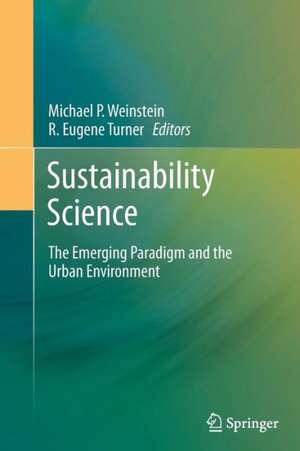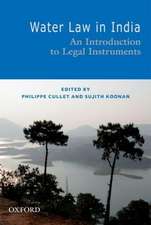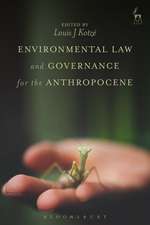Sustainability Science: The Emerging Paradigm and the Urban Environment
Editat de Michael P. Weinstein, R. Eugene Turneren Limba Engleză Paperback – 10 iun 2014
| Toate formatele și edițiile | Preț | Express |
|---|---|---|
| Paperback (1) | 952.40 lei 6-8 săpt. | |
| Springer – 10 iun 2014 | 952.40 lei 6-8 săpt. | |
| Hardback (1) | 959.19 lei 6-8 săpt. | |
| Springer – 28 mai 2012 | 959.19 lei 6-8 săpt. |
Preț: 952.40 lei
Preț vechi: 1161.47 lei
-18% Nou
Puncte Express: 1429
Preț estimativ în valută:
182.27€ • 189.58$ • 150.47£
182.27€ • 189.58$ • 150.47£
Carte tipărită la comandă
Livrare economică 12-26 aprilie
Preluare comenzi: 021 569.72.76
Specificații
ISBN-13: 9781493900510
ISBN-10: 149390051X
Pagini: 464
Ilustrații: XX, 444 p.
Dimensiuni: 155 x 235 x 24 mm
Greutate: 0.64 kg
Ediția:2012
Editura: Springer
Colecția Springer
Locul publicării:New York, NY, United States
ISBN-10: 149390051X
Pagini: 464
Ilustrații: XX, 444 p.
Dimensiuni: 155 x 235 x 24 mm
Greutate: 0.64 kg
Ediția:2012
Editura: Springer
Colecția Springer
Locul publicării:New York, NY, United States
Public țintă
Professional/practitionerCuprins
Foreword.- Section I Managing the Earth's Life Support Systems: The Emergence of Sustainability Science and Transdisciplinarity.- From the Unity of Nature to Sustainability Science: Ideas and Practice.- Sustaining Sustainability: Creating a Systems Science in a Fragmented Academy and Polarized World.- A Landscape Approach for Sustainability Science.- It's OK to Talk about Sustainability.- Section II Balancing Ecology and Economy: Natural Capital and Quality of Life.- The Value of Natural and Social Capital in Our Current Full World and in a Sustainable and Desirable Future.- Steps Towards Sustainability and Tools for Restoring Natural Capital: Etang de Berre (Southern France) Case Study.- Sustainability of Biodiversity under Global Changes, with Particular Reference to Biological Invasions.- Section III From Science to Policy: Managing the Commons, Social Learning and Social Responsibility.- Post-Sustainability: the Emergence of the Social Sciences as the Hand-Maidens of Policy.- The Purpose and Politics of Ecosystem-Based Management.- Sustainable Coastal Margins: Challenges of Tempo and Mode for the Policy Domain.- Forest and Fishery Transitions to Sustainability.- Session IV The Ecology of Cities.- Cities as Dissipative Structures: Global Change and the Increasing Vulnerability of Urban Civilization.- A Mathematical Description of Urban Metabolism.- Urbanization, Local Government and Planning for Sustainability.- Climate Change, Globalization, and the Double Exposure Challenge to Sustainability: Rolling the Dice in Coastal New Jersey.- Sustainability Trajectories for Urban Waters.- Session V Restoring and Rehabilitating Ecosystems: Return from the Precipice.- Reversing Two Centuries of Ecosystem Degradation: Can Science Better Inform Policy & Practice?.- Changing Nature: Novel Ecosystems, Intervention, and Knowing When to Step Back.- Knocking on Doors: Boundary Objects in Ecological Conservation and Restoration.- Sustainability: More about the Toolmaker than the Tools.- Epilogue.- The Challenge of Sustainability: Lessons from an Evolutionary Perspective.- Index.
Textul de pe ultima copertă
A new paradigm for ‘use-inspired’ research, informed decision making and development of science-based policy is emerging at the very heart of the global sustainability transition. Sustainability science attempts to unravel the complexities of the coupled Human-Environment System and address the core sustainability challenges of the 21st century:
• Reconciling society’s development goals with the planet’s environmental limits
• Understanding the fundamental character of interactions between nature and society
• Advancing the social and technological knowledge related to sustainability, and using such knowledge for action
• Balancing social and environmental well-being, quality of life, and equity with wise-management and conservation of natural resources
The topics in this book focus on emerging research and policy in, a) sustainability science, b) the ecology of cities, c) landscape ecology – scale, spatial patterns, organizational levels, and ecological processes, and d) related topics in resource exploitation and management, the valuation of natural and social capital, habitat and biodiversity conservation, social learning, ecosystem based management, and integrated watershed-coastal zone management.
• Reconciling society’s development goals with the planet’s environmental limits
• Understanding the fundamental character of interactions between nature and society
• Advancing the social and technological knowledge related to sustainability, and using such knowledge for action
• Balancing social and environmental well-being, quality of life, and equity with wise-management and conservation of natural resources
The topics in this book focus on emerging research and policy in, a) sustainability science, b) the ecology of cities, c) landscape ecology – scale, spatial patterns, organizational levels, and ecological processes, and d) related topics in resource exploitation and management, the valuation of natural and social capital, habitat and biodiversity conservation, social learning, ecosystem based management, and integrated watershed-coastal zone management.
Caracteristici
This book highlights sustainability science by addressing key challenges for scientists
A goal of this book is to try and understand the workings of complex systems when humans are involved
Greater degrees of integration across science and technology systems is a key factor in matching solutions to sustainability problems
A goal of this book is to try and understand the workings of complex systems when humans are involved
Greater degrees of integration across science and technology systems is a key factor in matching solutions to sustainability problems












